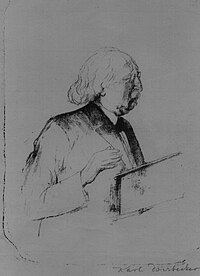Hermann Cohen
| Hermann Cohen | |
|---|---|

Hermann Cohen by Karl Doerbecker
|
|
| Born | 4 July 1842 Coswig, Anhalt, Germany |
| Died | 4 April 1918 (aged 75) Berlin, Germany |
| Nationality | German |
| Alma mater |
Jewish Theological Seminary of Breslau University of Breslau Humboldt University of Berlin University of Halle-Wittenberg |
| Doctoral students | Ernst Cassirer, Paul Natorp, Hans Kelsen |
Hermann Cohen (4 July 1842 – 4 April 1918) was a German Jewish philosopher, one of the founders of the Marburg School of Neo-Kantianism, and he is often held to be "probably the most important Jewish philosopher of the nineteenth century".
Cohen was born in Coswig, Anhalt. He early began to study philosophy, and soon became known as a profound student of Kant. He was educated at the Gymnasium at Dessau, at the Jewish Theological Seminary of Breslau, and at the universities of Breslau, Berlin, and Halle. In 1873, he became Privatdozent in the philosophical faculty of the University of Marburg, the thesis with which he obtained the venia legendi being Die systematischen Begriffe in Kant's vorkritischen Schriften nach ihrem Verhältniss zum kritischen Idealismus. Cohen was elected Professor extraordinarius at Marburg in 1875, and Professor ordinarius in the following year (see: "Academic ranks in Germany").
He was one of the founders of the "Gesellschaft zur Förderung der Wissenschaft des Judenthums", which held its first meeting in Berlin in November 1902.
Cohen edited and published Friedrich Albert Lange's final philosophical work (Logische Studien, Leipzig, 1877). Cohen edited and wrote several versions of a long introduction and critical supplement to Lange's Geschichte des Materialismus.
...
Wikipedia
